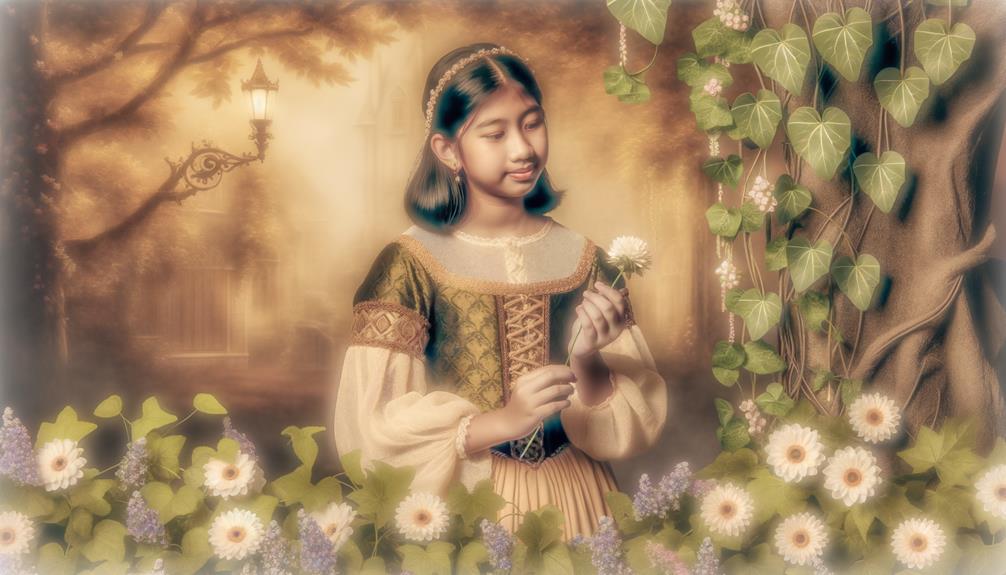Eloise Name Origin and Meaning
The name Eloise originates from the Old High German name Helewidis, combining 'heil,' meaning 'healthy,' and 'wid,' meaning 'wide' or 'wood.' Medieval French influences transformed it into Héloïse, popularized through chivalric romance and historical figures such as Héloïse d'Argenteuil. The name saw a resurgence during the Enlightenment, symbolizing intellectual and romantic qualities.
Its cultural significance further expanded through literature, media, and influential historical personalities. Eloise continues to enjoy modern popularity, with endearing nicknames like Ellie and Lola.
For a deeper insight into its enduring appeal and notable bearers, further examination offers illuminating details.

Key Takeaways
- Eloise originates from the Old High German name Helewidis, meaning 'healthy' and 'wide' or 'wood'.
- The name Eloise was popularized in medieval French literature and romantic tales.
- Eloise symbolizes physical health and a connection to nature due to its etymological roots.
- The name gained literary significance through the tragic love story of Héloïse and Abélard.
- Modern variations include Heloise, Eloisa, and Elouise, with nicknames like Ellie and Lola.
Linguistic Roots
The name Eloise originates from the Old High German name Helewidis, which is composed of the elements 'heil,' meaning 'healthy' or 'hale,' and 'wid,' meaning 'wide' or 'wood.'
This etymological construction underscores a combination of attributes, suggesting robustness and expansiveness. The prefix 'heil' conveys a sense of energy and well-being, while 'wid' imparts an element of breadth or natural environment.
When these elements coalesce, they form a name imbued with connotations of both physical health and a connection to nature. The linguistic roots provide a nuanced understanding, revealing the cultural values embedded in the name.
Eloise, as such, is not merely a personal identifier but a linguistic artifact reflecting historical, linguistic, and cultural dimensions.
Historical Evolution
The historical evolution of the name Eloise reveals its initial prominence through Medieval French influence, which laid the foundation for its enduring appeal.
Its literary popularity surged with the 12th-century romance of Héloïse and Abélard, solidifying its cultural significance.
In contemporary times, Eloise demonstrates adaptive trends in modern usage, reflecting both traditional reverence and renewed interest.
Medieval French Influence
Medieval French culture played a pivotal role in the historical evolution of the name Eloise, reflecting the linguistic and societal influences of the time.
The name Eloise, derived from Héloïse, gained prominence during the Middle Ages, a period marked by the flourishing of French literature and chivalric romance.
The French adaptation of the Germanic name Helewidis, meaning 'healthy' and 'wide', underscores the linguistic transformation driven by regional dialects and cultural integration.
Additionally, the medieval period saw the name's association with notable historical figures, further embedding it in the societal consciousness.
Eloise's evolution during this era exemplifies how names were not only personal identifiers but also symbolic of broader cultural and linguistic currents in medieval French society.
Literary Popularity Rise
Literary fascination with the name Eloise surged during the Enlightenment, driven by its prominent inclusion in works of literature and romantic epistolary novels that captivated the European imagination. This period witnessed a heightened interest in classical learning, which often reflected in literary choices. The romantic tale of "Héloïse and Abélard" became a symbol of tragic love, further entrenching Eloise in the cultural lexicon.
| Aspect | Details |
|---|---|
| Era | Enlightenment |
| Literary Works | "Héloïse and Abélard" |
| Cultural Impact | Symbol of tragic love |
| Language Influence | French and English literature |
This surge of literary prominence during the Enlightenment solidified Eloise as a name imbued with intellectual and romantic significance, influencing its enduring appeal.
Modern Usage Trends
As the Enlightenment's literary fascination with Eloise waned, the name continued to evolve, adapting to changing cultural and societal contexts in the modern era.
In the 20th century, Eloise experienced a resurgence, largely attributed to the popular children's book series 'Eloise' by Kay Thompson. This revitalization reflected a broader trend of reviving classic names, aligning with a societal inclination towards nostalgic yet timeless choices.
In recent decades, Eloise has maintained steady popularity, particularly in English-speaking countries. Its enduring appeal can be attributed to its melodic sound, historical richness, and versatile usage across various cultures.
Modern parents often seek names that balance tradition with contemporary relevance, making Eloise a fitting choice in the evolving landscape of baby naming trends.
Cultural Significance
The name Eloise carries substantial cultural significance, underscored by its prominent appearances in literature and media, such as the beloved children's book series 'Eloise' by Kay Thompson.
Historical figures named Eloise have also contributed to the name's enduring legacy, reflecting its timeless appeal.
Contemporary trends reveal a resurgence in the popularity of Eloise, indicating a broader cultural resonance that transcends generations.
Literature and Media Influence
Eloise's cultural significance has been profoundly shaped by its presence in literature and media, particularly through the iconic children's book series 'Eloise' by Kay Thompson. First published in 1955, this series introduced the world to a spirited and imaginative six-year-old girl living in New York City's Plaza Hotel. The character's vibrant personality and whimsical adventures have left a lasting impact on popular culture, endearing 'Eloise' to generations of readers.
The books' success spurred adaptations into television movies and animated series, further cementing Eloise's place in the cultural lexicon. This widespread media presence has elevated the name Eloise, infusing it with a sense of charm, sophistication, and timeless appeal that continues to resonate.
Historical Figures Named Eloise
Throughout history, numerous figures named Eloise have made significant cultural contributions, reflecting the name's enduring legacy and influence across various fields. Among them:
- Héloïse d'Argenteuil: A 12th-century French nun, writer, and scholar, Héloïse's letters with Peter Abelard are celebrated for their intellectual depth and emotional intensity.
- Eloise Hughes Smith: A Titanic survivor who played a pivotal role in commemorating the disaster and advocating for maritime safety reforms.
- Eloise Lownsbery: An American author known for her historical fiction, which has been influential in children's literature.
- Eloise Greenfield: An acclaimed American poet and author whose works highlight African American experiences and have won numerous literary awards.
These individuals exemplify the cultural and intellectual impact of those bearing the name Eloise.
Modern Popularity Trends
Recent data indicates a resurgence in the popularity of the name Eloise, driven by cultural influences such as literature, media, and celebrity endorsements.
The name's appearance in well-regarded novels and popular television series has contributed to its renewed appeal. In addition, celebrities naming their children Eloise has further cemented its status as a fashionable choice.
This resurgence is reflective of broader naming trends that favor vintage and classical names, which evoke a sense of timeless elegance.
The phonetic aesthetics of Eloise—its melodic and sophisticated sound—resonate with modern parents seeking names that are both distinctive and culturally resonant.
Consequently, Eloise has experienced a notable climb in contemporary baby name rankings, underscoring its growing cultural significance.
Popularity Over Time
Although the name Eloise has experienced fluctuations in its popularity, it has consistently remained a timeless choice, reflecting both cultural and historical trends. Examining its trajectory reveals insightful patterns:
- Medieval Popularity: Eloise was a favored name during the medieval period, often associated with noble lineage and classical literature.
- 19th Century Resurgence: The name saw a revival in the 19th century, coinciding with the romanticism movement, which embraced historical and literary names.
- Mid-20th Century Decline: A noticeable decline occurred mid-20th century, as modern and simplistic names gained favor.
- 21st Century Revival: In recent decades, Eloise has surged back into popularity, driven by contemporary parents' preference for vintage and elegant names.
These periods underscore the name's enduring appeal and its cyclical nature in naming trends.
Famous Bearers
Many celebrated individuals have borne the name Eloise, each contributing to its cultural resonance and enduring charm.
Eloise Wilkin, a renowned American illustrator, is celebrated for her work in children's literature, particularly within the Little Golden Books series.
Eloise Mumford, an accomplished actress, has further popularized the name through her roles in film and television, including the 'Fifty Shades' series.
The fictional character Eloise, created by Kay Thompson, has left an indelible mark on children's literature with her adventures in the Plaza Hotel.
These figures, both real and fictional, demonstrate the versatility and appeal of the name Eloise, illustrating its capacity to be associated with creativity, talent, and a timeless, endearing quality that resonates across generations.
Variations and Nicknames
The name Eloise, rich in history and cultural significance, has inspired a variety of intriguing variations and affectionate nicknames that reflect its adaptability and global appeal. These variations not only highlight the name's linguistic versatility but also its cultural resonance across different regions.
Common variations include:
- Heloise: A medieval French variant, often associated with scholarly and literary connotations.
- Eloisa: A more romanticized form, prevalent in Spanish and Italian-speaking countries.
- Aloisia: A Germanic version, adding a distinct historical and regional flavor.
- Elouise: A more phonetic variation, simplifying pronunciation while retaining elegance.
Nicknames such as Ellie, Lola, and Lou offer endearing alternatives, making the name accessible and cherished in everyday use. Each variation and nickname adds a unique dimension to the timeless appeal of Eloise.
Modern Usage
In contemporary settings, the name Eloise has experienced a resurgence in popularity, reflecting broader trends in the revival of classic names. This renewed interest can be attributed to a combination of cultural influences, including literature, media, and a general shift towards vintage names that carry both elegance and a timeless appeal.
Celebrities and public figures have also contributed to this trend by choosing Eloise for their children, thereby increasing its visibility and desirability. Data from baby name registries indicate a steady climb in the name's rank, underscoring its growing acceptance among new parents.
Moreover, the name's melodic sound and rich historical background make it an attractive choice for those seeking a name that is both distinctive and rooted in tradition.
Conclusion
The name Eloise, with its rich linguistic roots and historical evolution, carries significant cultural weight. Its popularity has fluctuated over time, yet it remains a name of enduring charm. The name Eloise has French, English, and German origins, adding to its cultural significance and appeal. Its roots can be traced back to the Germanic name Helewidis, which was composed of the elements heil, meaning “healthy,” and wid, meaning “wide”. This reflects the name’s enduring charm and positive connotations, making it a popular choice for parents seeking a meaningful and timeless name for their child. For more information on the Adele meaning and origin, it would be interesting to explore its linguistic roots and historical evolution as well.
Notable bearers have contributed to its lasting appeal, while variations and nicknames add layers of complexity. Modern usage continues to evolve, hinting at future trends.
Will the name Eloise ascend to new heights of popularity, or will it quietly retain its classic allure? Only time will reveal its ultimate destiny.






